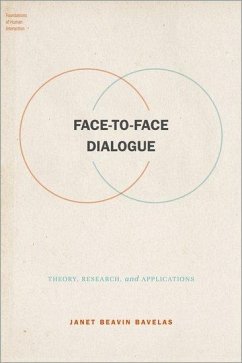Face-to-face dialogue is our basic form of language use. It is, and always has been, the only form of language use that spans all cultures and societies. Face-to-Face Dialogue: Theory, Research, and Applications focuses on the unique combination of features that make face-to-face dialogue the fastest, most precise, and most skillful activity that ordinary individuals do together. Writing for an inter-disciplinary readership, Bavelas draws on her research program of over three decades to reveal the unique features of face-to-face dialogue. Unlike written or mediated forms, face-to-face dialogue uses both speech and co-speech gestures and also permits rapid-even simultaneous-exchanges. This book demonstrates the importance of focusing on interactions rather than individuals and on specific multi-modal acts rather than all nonverbal communication. Bavelas's mixed research methods begin inductively, leading to experiments with qualitative measures. Second-by-second microanalysis uncovers details of how a dialogue works. By focusing on communication as joint action, Face-to-Face Dialogue refocuses the conversation around the science of human communication, with realizable practical applications for researchers and professionals alike.
Bitte wählen Sie Ihr Anliegen aus.
Rechnungen
Retourenschein anfordern
Bestellstatus
Storno








